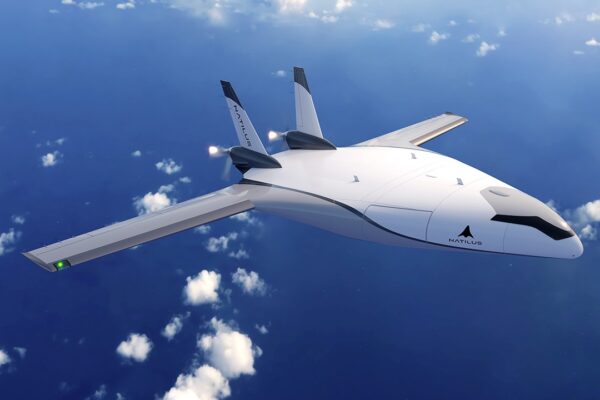Two months ago we reported on how Covid and other factors have brought about a change in the need for moving cargo by air rather then sea.
Now, U.S. autonomous cargo drone developer Natilus has announced advanced purchase commitments of more than US$6bn for the delivery of 440+ aircraft in pre-orders. California-based Natilus, which said it is producing the world’s first purposefully designed and manufactured autonomous aircraft for airfreight transport, aims for its aircraft range to increase cargo volume by 60%, while cutting costs by 60% and lowering carbon emissions by half.
Orders are from companies including Volatus Aerospace, Astral Aviation, Aurora, Dymond and Flexport. Earlier this month, Flexport placed an advanced purchase commitment for one of Natilus’s larger cargo UAV designs, the 100t, pitting cargo drone technology squarely in competition with conventional aircraft.
The designs conform to ‘blended wing body’ (BWB) geometry, where the aircraft’s fuselage generates lift along with the wings. And despite its unusual appearance, Natilus’s designs are based on established aerodynamic principles, similar to the Northrop Grumman B-2 Spirit, a stealth bomber.
Founded in 2016, Natilus is looking to upend air cargo transport not by identifying and optimizing empty passenger space on aircraft for freight use as many logistics companies have in recent decades. Instead, it is out to create entirely new drones dedicated to the activity – next-generation craft that can slash the costs of that transport to boot.
The company says its fully autonomous, remotely piloted aircraft provide greater efficiency, lower operational costs, and increased security that will introduce a third option to individuals and companies now relying on standard modes of sending goods around the world.
Natilus CEO Aleksey Matyushev said: “In parallel with the development of our family of autonomous aircraft, we are working closely with customers to increase the efficiency of air transport and make it more competitive and safer than ocean shipping.
“Today, there are only two ways to move cargo internationally: by air and by sea. The difference between the cost and time of these two modes of transportation is dramatic. Sea freight is currently 13 times less expensive than air freight; but 50 times slower in delivery. Natilus intends to revolutionize the transport industry by providing the timeliness of air freight at an affordable cost reduction of 60%, making air cargo transportation substantially more competitive.”
Natilus says software in its ground control system minimizes pilot training and workload, permitting a single operator to fly three of the cargo drones at once. Its cloud-based navigation system interfaces with satellites to communicate with and control the craft, and is backed up by an onboard autopilot.
The company says industry analyses currently estimate the market for autonomous cargo drones at US$280 billion, which would more than double the air freight market to US$470 billion.
Natilus aircraft use existing ground infrastructure and standard air cargo containers.
Here at Colless Young we like to keep up to date with all the latest developments in the logistics industry. As a licensed Customs Broker and International Freight Forwarder, we offer you professional advice on all your overseas shipping activities. We provide a complete range of services, both air and sea cargo, for your imports and exports, at all Australian ports and airports.

